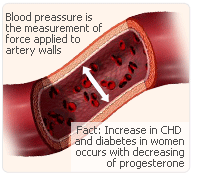
As the main cause of death among women aged 50-79 in the United States, coronary heart disease (CHD) is a major health concern. Women undergoing menopause are particularly prone to CHD due a loss of female sex hormones such as the progesterone hormone, brought about by menopause. This investigation looks at the effect of lower progesterone hormone levels on both diabetes and CHD, taking into account several key factors. It also discusses the idea that sex hormones such as the progesterone hormone are beneficial in the fight against hypertension and CHD.
Even though CHD is rarer in women who have not yet entered menopause than in males, this difference weakens after the start of menopause. This is most probably because levels of female sex hormones like the progesterone hormone are much lower during menopause.
After menopause, increased blood pressure and CHD occur in conjunction with the loss of ovarian function, and, together with reduced progesterone hormone levels brought about by menopause, they show that the progesterone hormone might help in the battle against hypertension and CHD.
progesterone vascular

Investigations have shown that diabetes eliminates the normal sex difference where CHD is present. Moreover, an increase in CHD among females in the US parallels a rise in the rate of both hypertension and diabetes with advanced age. Studies suggest that diabetes can deter the protective effects of female sex hormones such as the progesterone hormone prior to menopause.
The distinction between the proportion of CHD in women who have yet to enter menopause and men of equal age suggests that either sex or endogenous sex hormones such as the progesterone hormone, have a considerable influence on the vasculature (blood vessels in the body). Regardless of the fact that risk factors for CHD are similar in both men and women, few large-scale studies have been performed exclusively on females.
In the Framingham Study, it was revealed that for people aged between 50 and 59, diabetes mellitus was a larger risk factor for CHD in women than in men. Additionally, an epidemiological study from Rancho Bernardo showed a greater death rate among women with CHD and diabetes compared to women free of diabetes.
In the same way as age-related increases in CHD, hypertension is a problem affecting industrialized nations such as the United States.
The mechanisms by which diabetes deters the cardiovascular protective impact of female sex hormones such as progesterone hormone in women yet to enter menopause are not really known.
Researchers claim that there is data to suggest that high levels of insulin can add to the high rate of atherosclerotic CHD among women with diabetes. Hence, it can be said that controlling metabolic abnormalities can lighten the burden of cardiovascular disease in women with diabetes mellitus, but more trials are needed to confirm this.
Conclusion 2: This study shows that the progesterone hormone may help in the fight against both hypertension and CHD. In terms of its relationship with diabetes, research suggests that diabetes can hinder the protective effects of the progesterone hormone and other sex hormones. Differences between increased CHD in women who have yet to enter menopause and men of equal age imply that either sex or hormones such as the progesterone hormone, have a significant influence on the vasculature. However, the ways in which diabetes deters the cardiovascular protective impact of the progesterone hormone in women are not well known and thus more research is necessary.